Posted on October 17, 2010 by The Orwell Prize -
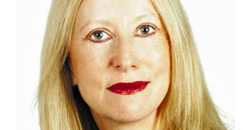
Mary Riddell is an assistant editor of the Daily Telegraph, where she is a columnist and political interviewer. A former deputy editor of Today, she has written for a number of national newspapers, including The Observer, on social, constitutional and foreign affairs, as well as covering criminal justice and Westminster politics. Her writing awards include Interviewer of the Year in the British Press Awards and a commendation in the feature-writing category. She has twice been named legal journalist of the year by the Bar Council and has previously been shortlisted for the Orwell Prize for Journalism (2008).
Submitted articles
Other links
Posted on October 17, 2010 by The Orwell Prize -

The Refuge and the Fortress deals with British attitudes towards people fleeing racial, religious or political persecution in their own country. Current prejudice against asylum seekers is not new. It echoes much of the rhetoric that greeted Jewish refugees from Tsarist pogroms at the turn of the 20th century, and those escaping Hitler in the 1930s. But this only tells half the story. As well as rejection and hostility, there has always been a characteristically British generosity and kindness towards those who have suffered cruelty and injustice. The book tries to make sense of these conflicting responses. At times, it seems, Britain offers a tale of two countries – the xenophobic and the open-hearted. The aim of the book is to make sense of these apparent contradictions, through direct testimonies of refugees and their descendants over the past 75 years. In doing so, we can also gain an insight into the elusive quality of what it means to be British – a question which is now at the centre of much social and political debate.
Posted on October 17, 2010 by The Orwell Prize -

Likely to touch on politics, business, economics, and music from punk rock to hard drivin’ rhythm & blues.
Submitted blogposts
Other links
Posted on October 17, 2010 by The Orwell Prize -
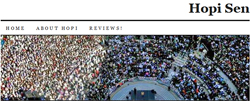
My name is Hopi Sen. Really. Escaping a lucrative career in advertising (which ended when I saw a lifetime of Daz adverts stretching before me and resigned in panic) I started work for the Labour party as the Northern region press officer in 2000. After the 2001 election I moved to Party HQ, before becoming the head of campaigns at the Parliamentary Labour Party. I had various stints on by-elections and General Elections- like working as a press officer to the Leader of the party during the 2005 campaign, a job that mostly involved feeding journalists chocolate and offending Quentin Letts. For six years I was one of those people who are occasionally glimpsed in the background of a photo-op, looking stressed in a cheap suit and in all likelihood sweating profusely. We’re a noble and maligned breed. Now I’ve escaped.
Submitted blogposts
Other links
- Hopi Sen
- Hopi Sen, Jo Glanville and Maajid Nawaz, ‘1984: Thoughtcrime’, Orwell Festival 2009
The triumph of the Tory Eurosceptics. Shannon Matthews, Family Breakdown and progressives. Fighting Back… That Cameron speech in Full The iconography of the angry rich man. Loving the whip. Cameron’s Neo-Hooverism 800 years or 42 days? Above all, try something. A progressive approach to Welfare reform?
Posted on October 17, 2010 by The Orwell Prize -

Eva Figes and her family fled the horror of Nazi Germany when Eva was only six, forced to leave behind them friends, relatives and their housemaid, Edith. Ten years later, Edith suddenly re-enters their lives. Having miraculously survived wartime Berlin, she had reluctantly emigrated to hostile, volatile Palestine. Recounting Edith’s story, Figes boldly argues that Israel was a product of US foreign policy and continuing and widespread anti-Semitism. Part memoir, part brave polemic, Journey to Nowhere is both a moving account of post-war displacement and a fierce attack on America’s role in the Middle East.
Posted on October 17, 2010 by The Orwell Prize -
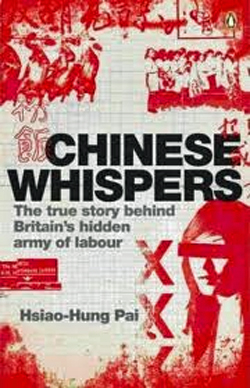
You know the people in this book. You’ll remember the harassed waitress from your local Chinese restaurant. You’ve noticed those builders across the street working funny hours and without helmets. You’ve eaten the lettuce they picked, or bought the microwave they assembled. The words ‘cockle-pickers’, ‘Morecambe Bay’, ‘Chinese illegals found dead in lorry’ will ring a bell. But did you know that there are hundreds of thousands of illegal Chinese immigrants in Britain? They’ve travelled here because of desperate poverty, and must keep their heads down and work themselves to the bone. Hsiao-Hung Pai, the only journalist who knows this community, went undercover to hear the stories of this hidden work force. She reveals a scary, shadowy world where human beings are exploited in ways unimaginable in our civilized twenty-first century. Chinese Whispers exposes the truth behind the lives of a hidden work force here in Britain. You owe it to yourself, and them, to read it.
Posted on October 17, 2010 by The Orwell Prize -

David Reynolds was shortlisted for a series of pieces on America, Empire of Liberty on BBC Radio 4 and BBC News Online. The Professor of International History at Cambridge University and a Fellow of Christ’s College, he is a regular visitor to the United States and has held visiting university appointments at Harvard, Nebraska and Oklahoma.
Submitted articles
Other links
Posted on October 17, 2010 by The Orwell Prize -
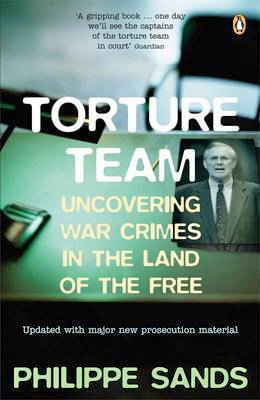
After 9/11. George W. Bush’s administration declared that they were going to have to work through ‘the dark side’. And they did: they turned their backs on international law and on America’s history of respecting human rights. They wanted only legal advice that made it okay to torture, and they made sure they got it. Voices of dissent were sidelined, while low level officials brainstormed interrogation techniques and took their lead from Jack Bauer in 24. In Torture Team, Philippe Sands tracks down and interviews those responsible, and makes a compelling case that, in an ugly blotch on Americda’s recent past, war crimes were committed for which no one has yet been held to account.
Posted on October 17, 2010 by The Orwell Prize -

Home of the Freedom Pass Anarchists and the wonderful world of professional wrestling, psychogeography, allotments and the class struggle. On the day that I retired from my final job as a lockkeeper I left the following on the wall. …… I started work at fifteen years of age Worked on the river and at sea but I also worked in factories and fields. In the circus and in films. I never achieved much. But I never crossed a picket line. Never judged a fellow worker by their colour or creed Nor sucked up to the bosses for my own ends….. Pretty much sums it all up.
Submitted blogposts
Other links
Posted on October 17, 2010 by The Orwell Prize -
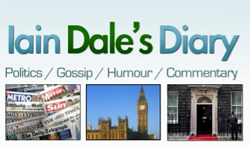
Iain Dale is one of Britain’s leading political commentators, appearing regularly on TV and radio. Iain is best known for his political blog, Iain Dale’s Diary, and football blog, West Ham Till I Die. He is a contributing editor and columnist for GQ Magazine, writes for the Daily Telegraph and a fortnightly diary for the Eastern Daily Press. He was the chief anchor of Britain’s first political internet TV channel, 18 Doughty Street.com and is a presenter on LBC Radio. He appears regularly as a political pundit on Sky News, the BBC News Channel, Newsnight, Radio 4 and Radio 5 Live. He is the publisher of the monthly magazine, Total Politics and the author or editor of more than twenty books. He is managing director of Biteback Publishing.
Submitted blogposts
Other links
- Iain Dale’s Diary
- Iain Dale, Peter Hitchens and Ed Vaizey, ‘What is the big Conservative idea?’ at the Sunday Times Oxford Literary Festival 2009
Posted on October 17, 2010 by The Orwell Prize -
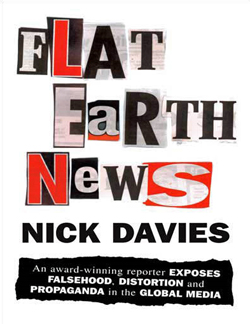
‘Finally I was forced to admit that I work in a corrupted profession.’ When award-winning journalist Nick Davies decided to break Fleet Street’s unwritten rule by investigating his own colleagues, he found that the business of reporting the truth had been slowly subverted by the mass production of ignorance. Working with a network of off-the-record sources, Davies uncovered the story of the prestigious Sunday newspaper which allowed the CIA and MI6 to plant fiction in its columns; the newsroom which routinely rejects stories about black people; the respected paper that hired a professional fraudster to set up a front company to entrap senior political figures; the newspapers which support law and order while paying cash bribes to bent detectives. Davies names names and exposes the national stories which turn out to be pseudo events manufactured by the PR industry, and the global news stories which prove to be fiction generated by a new machinery of international propaganda. He shows the impact of this on a world where consumers believe a mass of stories which, in truth, are as false as the idea that the Earth is flat – from the millennium bug to the WMD in Iraq – tainting government policy, perverting popular belief. He presents a new model for understanding news. With the help of researchers from Cardiff University, who ran a ground-breaking analysis of our daily news, Davies found most reporters, most of the time, are not allowed to dig up stories or check their facts – a profession corrupted at the core. Read All About It. The news will never look the same again.
Posted on October 17, 2010 by The Orwell Prize -

The war on terror is being lost – but not just in Iraq. As this devastating book shows, the real crisis zone now lies in central Asia. Veteran reporter Ahmed Rashid has unparalleled access to the region and knows its leading players, from presidents to warlords. Here he documents how closely Pakistan’s US-backed regime is linked with extremists; how broken promises in Afghanistan have led to a resurgent Taliban fed by drugs money; and how the largest landmass in the world is now a breeding ground for terrorism. In this story of squandered opportunities, misguided alliances and double-dealing, Rashid pinpoints with chilling accuracy where the true threat to our global security comes from.
Posted on October 17, 2010 by The Orwell Prize -

Catherine Philp is diplomatic correspondent for The Times. She has specialised in conflict, with ten years spent based overseas, covering wars in Afghanistan, Iraq, East Timor, Pakistan, Sri Lanka, Nepal, Cambodia, Indonesia, Darfur, Congo and Zimbabwe.
Submitted articles
Other links
Posted on October 17, 2010 by The Orwell Prize -
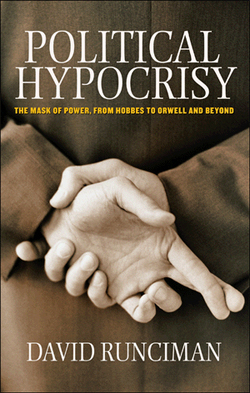
What kind of hypocrite should voters choose as their next leader? The question seems utterly cynical. But, as David Runciman suggests, it is actually much more cynical to pretend that politics can ever be completely sincere. The most dangerous form of political hypocrisy is to claim to have a politics without hypocrisy. Political Hypocrisy is a timely, and timeless, book on the problems of sincerity and truth in politics, and how we can deal with them without slipping into hypocrisy ourselves. Runciman tackles the problems through lessons drawn from some of the great truth-tellers in modern political thought – Hobbes, Mandeville, Jefferson, Bentham, Sidgwick, and Orwell – and applies his ideas to different kinds of hypocritical politicians from Oliver Cromwell to Hillary Clinton. Runciman argues that we should accept hypocrisy as a fact of politics, but without resigning ourselves to it, let alone cynically embracing it. We should stop trying to eliminate every form of hypocrisy, and we should stop vainly searching for ideally authentic politicians. Instead, we should try to distinguish between harmless and harmful hypocrisies and should worry only about its most damaging varieties. Written in a lively style, this book will change how we look at political hypocrisy and how we answer some basic questions about politics: What are the limits of truthfulness in politics? And when, where, and how should we expect our politicians to be honest with us, and about what?
Posted on October 17, 2010 by The Orwell Prize -

Longlisted for blogposts published at PoliticalBetting.com and the Daily Kos. Greg Callus is the Deputy Editor of PoliticalBetting.com. PoliticalBetting.com is Britain’s most-read political blog – and the best online resource for betting on politics.
Submitted blogposts
Other links
Posted on October 17, 2010 by The Orwell Prize -
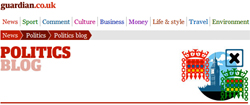
Andrew Sparrow is the senior political correspondent on The Guardian website. He trained as a journalist on the South Wales Echo. Since joining the parliamentary lobby in 1994, he has worked as a political correspondent for Thomson Regional Newspapers, the Western Mail, the Daily Mail and the Daily Telegraph. He has also written a book – Obscure Scribblers: A History of Parliamentary Journalism.
Submitted blogposts
Other links
Posted on October 17, 2010 by The Orwell Prize -
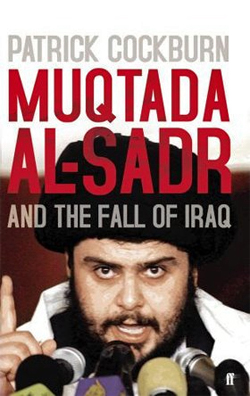
Muqtada al-Sadr, leader of the Shia insurgency and the Mehdi Army, is the most important political figure in post-occupation Iraq. At first grossly underestimated by the US, Muqtada has become the kingmaker of this divided country through a potent combination of nationalism and religious fervour. This is the first biography of the controversial and influential cleric, and draws on Patrick Cockburn’s more than thirty years of reporting from the Middle East, as well as being one of the few books to be based on interviews with Iraqi eyewitnesses. Muqtada al-Sadr is compulsory reading for anyone who wishes to understand the current state of Iraq. This paperback edition includes a new afterword which updates the story of Muqtada’s rise.
Posted on October 17, 2010 by The Orwell Prize -
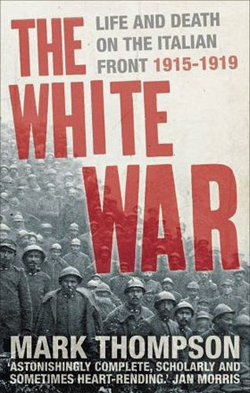
The first narrative history in English of the Italian front: a major forgotten conflict of the First World War. In May 1915, Italy declared war on the Habsburg Empire, hoping to seize its ‘lost’ territories of Trieste and Tyrol. The result was one of the most hopeless and senseless modern wars – and one that inspired great cruelty and destruction. Nearly three-quarters of a million Italians – and half as many Austro-Hungarian troops – were killed. Most of the deaths occurred on the bare grey hills north of Trieste, and in the snows of the Dolomite Alps. Outsiders who witnessed these battles were awestruck by the difficulty of attacking on such terrain. General Luigi Cadorna, most ruthless of all the Great War commanders, restored the Roman practice of ‘decimation’, executing random members of units that retreated or rebelled. Italy sank into chaos and, eventually, fascism. Its liberal traditions did not recover for a quarter of a century – some would say they have never recovered. Mark Thompson relates this nearly incredible saga with great skill and pathos. Much more than a history of terrible violence, the book tells the whole story of the war: the nationalist frenzy that led up to it, the decisions that shaped it, the poetry it inspired, its haunting landscapes and political intrigues; the personalities of its statesmen and generals; and also the experience of ordinary soldiers – among them some of modern Italy’s greatest writers. A work of epic scale, The White War does full justice to one of the most remarkable untold stories of the First World War.
- Mark Thompson, Patricia Clavin and Will Hutton on ‘How do we avoid political crisis after economic crash?’ at the Sunday Times Oxford Literary Festival 2009
















